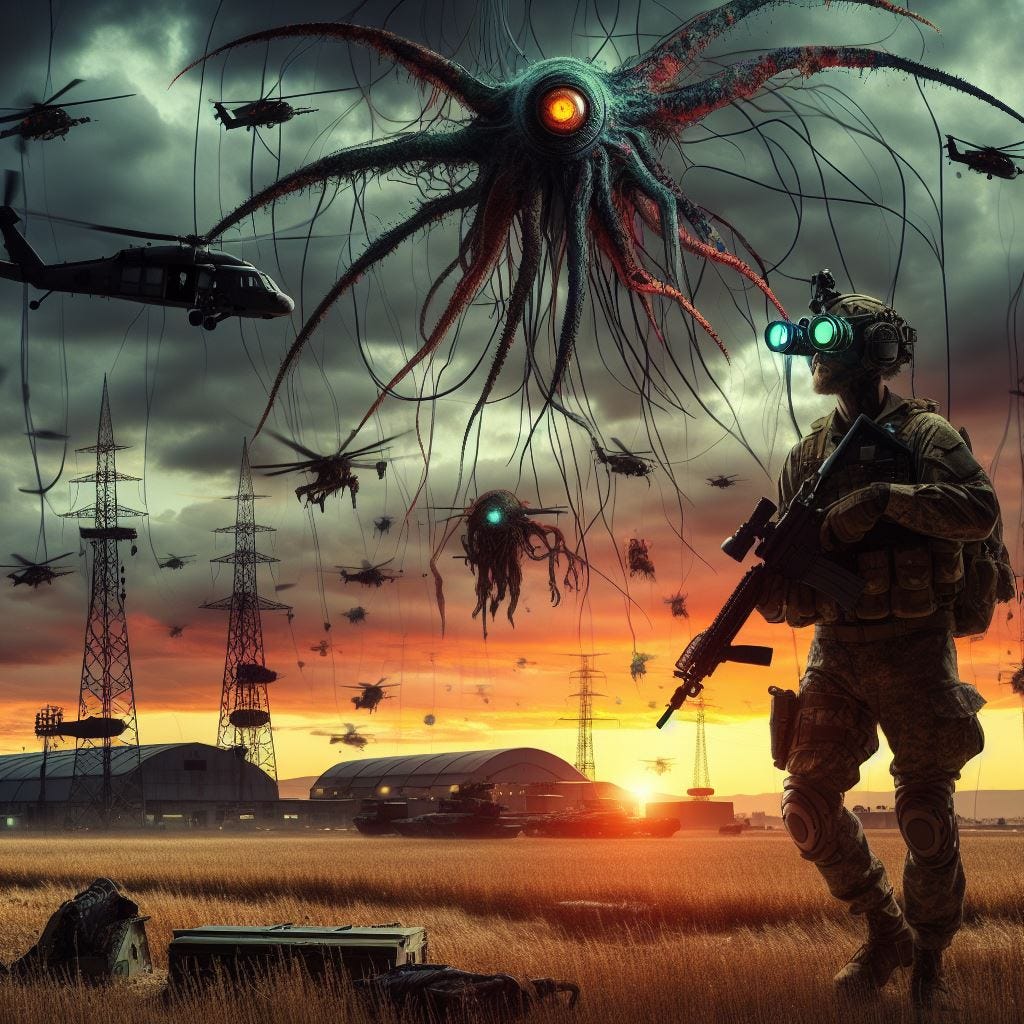Horror Goes to War
Getting weird and eerie on the military battlefield
Dear Living Dark reader,
It’s such an obvious question, but somebody has to ask it: How can a knowledge of the techniques of horror fiction help to improve military planning? (Obvious, right?) And for answering such a question, who could be better positioned than an associate professor in the Defense Analysis Department at the Naval Postgraduate School? And who better to summarize and amplify the matter than the J. C. Wylie Chair of Maritime Strategy at the Naval War College?
Today, as a momentary diversion, I share brief excerpts from two articles that kind of blow my mind by merely existing. I offer no analysis or substantial commentary. I simply point a textual finger and say, “Look! See!” And because you’re someone who is reading a publication like this one, I know you’ll share my bedazzled sense of odd fascination.
First, from that associate professor at the Naval Postgraduate School:
This article intends to argue that techniques from the writing of horror fiction can improve military planning. By focusing on such literature’s capacity to unsettle the reader, this article argues horror fiction may provide a useful medium for the unconstrained exploration of future conflicts in ways current planning processes cannot. More specifically, the article focuses on leveraging two aspects of horror literature—the “weird” and the “eerie”—to expand ideation around future wars. Failing to imagine the unsettling potentialities of rapidly changing technology and its interactions with human agency puts us at risk of falling into conflict environments that are not only difficult but fundamentally horrifying. Challenging oneself to work through these thought-scapes as one is planning, training, and equipping is far better than when one is engulfed in a war that seems shocking and alien.
— Leo Blanken, “The Weird and Eerie Battlefields of Tomorrow,” The Strategy Bridge, August 25, 2020
Second, from that maritime military strategy expert:
[Blanken’s article and Mark Fisher’s book The Weird and the Eerie] make a useful addition to your armory of implements for thinking about martial affairs, not to mention politics and life in general. . . . Blanken posits—and I agree—that consuming weird fiction primes military practitioners and analysts to notice weird or eerie anomalies in the profession of arms. Detecting a phenomenon is the first step toward adapting to it or turning it to advantage. Weird fiction can help us make sense of the past, survey the world around us, and potentially glimpse the future.
—James Holmes, “Read H. P. Lovecraft to Understand War,” 19FortyFive, September 4, 2022
For current examples of prominent weird and/or eerie phenomena, including some that may have value in “alert[ing] us to tenets of operation and strategy,” Holmes goes on to cite, among other things, the existence of UAPs, the invisible ubiquity of cyberspace, images of depopulated Ukrainian cities, photos of Chinese cities locked down under Xi Xinping's "zero covid" policy, and AI that learns faster than humans and can outfight us.
I pause to note that my wonderment at these articles may simply be a function of naivete or limited awareness. Blanken, in his piece, asserts that “such a proposal [to improve military planning by looking to horror fiction] should not seem that strange. The strategic use of science fiction writing by the military has already become mainstream. The U.S. Army and the Marine Corps have been recruiting budding futurists from among their ranks in science fiction writing contests for years.”
Despite this possibility, I personally find the overall point about weirdness reinforced by the sheer fact that such articles were written, let alone published. Weird and eerie indeed.
Warm regards,




not sure whether to file this under "further colonization of the Imaginal by mundane archonic forces" or "the truth is much worse than they're telling us."
best case: they've finally found the edge of what material reductionism can tell us about the world, and are treating it like any other border to be militarized. with any luck, that means their ontological project has reached its limits.
worst case: the James Webb telescope bumped into one of the Elder Gods, and they're slow-rolling the news.
also a good opportunity for paranormal research: Mark Fisher's furious ghost should be positively incandescent after having his work pressganged into military discourse.
Creepy and really odd to read this after rediscovering that I already subscribe to Peter Levenda's substack, which is even weirder. If you are not familiar with his writing, check out his Sinister Forces substack.